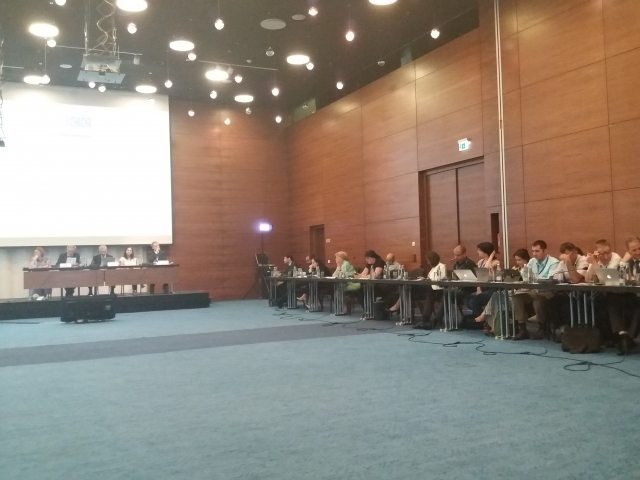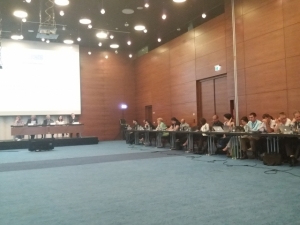OSCE Conference: Armenia Violently Tackled Azerbaijan
On July 18-19, the OSCE conference bearing on professional and ethical standards of journalism was hosted in the Radisson Blu Iveria Hotel in Tbilisi. It started with the welcoming remarks of the OSCE representative on Freedom of the Media, Harlem Désir. "Everyone makes mistakes, but the true journalist who attaches importance to quality of information will recognize its mistakes," He concluded.
Desir worries about the Internet Era which allows to release news faster but in which also fake news are gaining ground. The main problem is when fake news become more attractive than the Truth. "In the region and beyond, investigations are still seeing pressure from governments when it deals with corruption cases," he noted.
General remarks:
George Gogua, Journalist and Multimedia Reporter for Radio Free Europe/Radio Liberty (RFE/RL) gave its experiences on digital Media. He pointed out, bearing on statistics, that users and readers are looking for more visuals and shorter contents. In average, a e-user spends 10 seconds on Facebook. Therefore, journalists have to adapt the content, but the line between information an misinformation is thin and everyone has to be careful on their way to provide content.
Media literacy was also a key word of the session. Lusine Grigoryan, Media literacy expert, explained why. “People are the media, and if they cannot be critical, there is a threat”. As she reminded, Fake news are growing in Armenia since the revolution. Fake accounts, misused of articles, people has to be encouraged to be critical, there is a need to educate the audience. In Armenia, there is a Museum without equivalent, a Mobile Media Museum. It is an adventurer game in the Kingdom of Informia in which the aim is to find the truth and as well to promote Media Literacy.
Sami Ozuslu, Head, Turkish Cypriot Journalists’ Association dealt with Cyprus disinformation. He aimed with other journalists and the OSCE representative on Freedom of the Media to release a terminology book, to avoid semantic manipulation and division. For instance, currently, the Greek Cypriots speak about Greek coffee whereas the Turkish one preferred the name “Turkish coffee”. He wanted the audience to keep in mind that calling Turkish Cypriots “Force of occupation” and the university professor there “so-called professor” necessarily lead to division. Therefore, Cypriot journalism has to uniform vocabulary to reconcile the two sides.
Freedom of the Media in GEORGIA:
"Russia continues to occupy, pressure and threaten us as western values, by saying they are decadent. But in spite of its propaganda, the people of Georgia cultivates the freedom of speech” said David Zalkaliani, Minister of Foreign Affairs of Georgia. The Minister asks for unity in order to fight this propaganda and promote quality journalism over fake news." Zalkaliani, also affirmed that Transparency and Freedom of the Press is high on the Georgian agenda. Maybe as a testament to this is the result of Georgia receiving a better ranking in this topic in international statistics
However, Mamuka Anguladze, Media Program Manager affirmed that if Georgia is a country with competition and pluralism, the danger is not so far for the freedom journalists have. Members of the board of Trustees of the GPB (Georgian Public Broadcasting) frequently criticized NGOs, and make homophobic statements. Moreover, there are some concerns about the Georgian Court’s independence, and the neutrality of journalism. Indeed, the concentration of media power in the hands of Bera Ivanishvili could be a threat to a true pluralism. She also reminded that 2 journalists were attacked by Neo Nazi in Georgia and pointed out the lack of transparency from the government.
AZERBAIJAN:
For Kazimov, a freelance journalist, Azerbaijan is facing many problems on the topic. First, there is a lack of independence. Then, there is no alternative source of information than State or private media. Thus, there is a contradiction in the law. Indeed, an article guarantees the freedom to legally seek information but, in the meantime, the law allows above all, firms to keep and hide information. A journalist also denounced the interdiction for an American journalist to enter the country. Nevertheless, Hikmet Hajiyev, Spokesperson and Head of Press Service, Azeri Ministry of Foreign Affairs answered that “be journalist does not mean be above the law (…) he wanted to cover an area occupied by Armenia, that is forbidden, you have to understand that we are at war”. He also affirmed that there has been no censorship or pressure since 1998 and journalists are free to cover what they want, legally. By the way, since 2003, Azerbaijan has hosted several conferences about journalism.
However, fast, Azerbaijan became the target and the author of attacks with Armenia and the audience. During the second session on propaganda and freedom of the media, a member of the audience compared Azerbaijan to a “journalistic desert” in which “media independence is hard to reach."
Azerbaijan accused Armenia of doing a kind of Holocaust in the occupied Azeri territories. As a result, the representative of Armenia in the OSCE Conference reminded to Azerbaijan that the only one holocaust in the region has been the one the Ottoman Empire did against the Armenian people. Moreover, she reaffirmed that Armenia does not occupy any territories but "enhances democracy", “a concept that Azerbaijan cannot understand”. Then, the “right of reply” (the right to defend oneself against public criticism) was used and misused. The fight lasted around 10 minutes whereas the moderator was lost, and people were cutting speakers short.
At the end of the day, the draft resolution proposed was not revolutionary. Indeed, it recommends not to restrict freedom of speech, to ensure access to internet, to promote the independence of regulatory media authorities and to educate the audience (among other points).
Desir will visit soon Aerbaijan after having been in Armenia and Georgia.
By Antoine Dewaest












